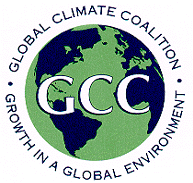 | |
| Abbreviation | GCC |
|---|---|
| Formation | 1989 |
| Dissolved | 2001 |
| Type | Advocacy group |
| Legal status | Nonprofit[1] |
| Purpose | Lobbying |
| Headquarters | Washington, D.C., U.S. |
| Website | As of 2006 at Internet Archive |
The Global Climate Coalition (GCC) (1989–2001) was an international lobbyist group of businesses that opposed action to reduce greenhouse gas emissions and engaged in climate change denial, publicly challenging the science behind global warming. The GCC was the largest industry group active in climate policy and the most prominent industry advocate in international climate negotiations. The GCC was involved in opposition to the Kyoto Protocol, and played a role in blocking ratification by the United States. The coalition knew it could not deny the scientific consensus, but sought to sow doubt over the scientific consensus on climate change and create manufactured controversy.[2]
The GCC was dissolved in 2001 after membership declined in the face of improved understanding of the role of greenhouse gases in climate change and of public criticism. It declared that its primary objective had been achieved: U.S. President George W. Bush withdrew the U.S., which alone accounted for nearly a quarter of the world's greenhouse gas emissions, from the Kyoto Protocol process through the Senate voting to not ratify the treaty. Thus, this rendered mandatory global reductions unreachable.[3][4][5][6]
- ^ Franz 1998
- ^ Industry Ignored Its Scientists on Climate Archived 2021-06-09 at the Wayback Machine, New York Times
- ^ Adam, David (December 7, 2005). "Oil industry targets EU climate policy". The Guardian. Archived from the original on June 10, 2021. Retrieved February 8, 2016.
During the 1990s US oil companies and other corporations funded a group called the Global Climate Coalition, which emphasised uncertainties in climate science and disputed the need to take action. It was disbanded when President Bush pulled the US out of the Kyoto process.
- ^ May 2005: The GCC was "deactivated" in 2001, once President Bush made it clear he intended to reject the Kyoto protocol.
- ^ Levy 2001: Without the participation of the United States, which accounts for nearly one-quarter of global emissions, the Kyoto Protocol is meaningless.
- ^ "Home". Global Climate Coalition. Archived from the original on October 14, 2002. Retrieved February 18, 2016.